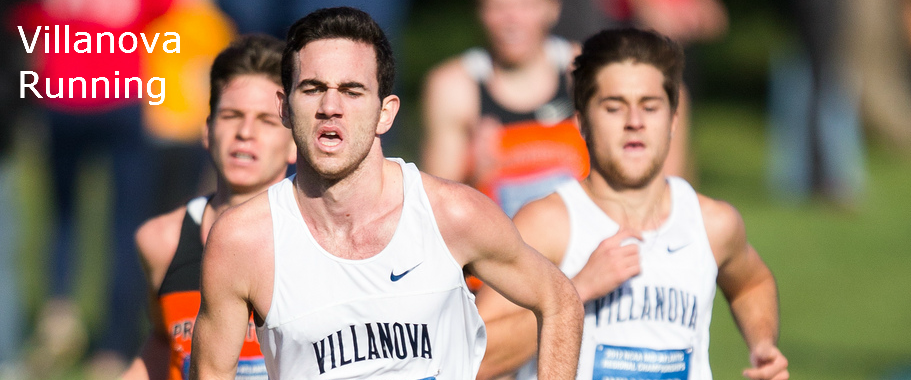Curtis, Goucher Lead U.S. Charge At Rock ‘n’ Roll Philly
Both runners aiming for an Olympic Trials Marathon qualifying time.
Written by: Bert Rosenthal

Bobby Curtis has overcome insomnia to become one of the top 10,000-meter runners in the United States. He'll make his half marathon debut in Philadelphia on Sunday. Photo: PhotoRun.net
Bobby Curtis couldn’t sleep and Adam Goucher couldn’t run.
Together, they made for a very frustrated twosome.
Now, however, tte Americans are ready and anxious to compete in this Sunday’s Rock ‘n’ Roll Philadelphia Half Marathon against a strong international field that includes defending champion Matthew Kisorio of Kenya.
Curtis, one of the nation’s best 10,000-meter runners, will be making his half-marathon debut and hopes to use it as a springboard for the Nov. 6 New York City Marathon, a distance he also will be running for the first time.
Goucher, also among the nation’s top distance competitors, is hoping to get the U.S. Olympic Trials qualifiying time of 65 minutes in order to compete at the trials in Houston on January 14, 2012. It will be his first attempt at the 26.2-mile distance. His wife, Kara, already has qualified.
A former star at Villanova, Curtis will feel at home in Sunday’s race. He also will be running at close to perfect health after battling conditioned insomnia for a number of years. The affliction cost him hours and hours of sleep, starting in 2004.
“I had difficulty sleeping and staying asleep,” the 2008 NCAA 5,000-meter champion said. “I had severe bouts for months. That went on for about four or five years. It was an emotionally related problem, not a physical one. I wasn’t sleeping well because of fear and anxiety. I had become obsessed and worried about not sleeping. It wasn’t easy.”
During that time, Curtis, 26, saw a series of doctors and specialists. He also attended a “sleep lab,” where his brain waves were measured. His body ingested a plethora of sleeping medications. “I tried so many things that weren’t working,” he said. “After not sleeping for a while, it becomes a psychological problem more than a physical one.”
“Sleep deprivation is performance-enhancing for the first week,” Curtis added.. “After that, it becomes real serious–it starts taking away from your performance. Since then, I’ve learned a few techniques that have helped me relax. I still have some difficulty sleeping, but it’s not affecting my training or my running, like it did in the past. In the past, it would go on for months and months.”
It got so bad that in 2009 Curtis told his coach he was giving up running because he was a “wreck.” He quit the sport and gave up school for about six months. A year later, he felt much better because he had overome his sleeping disorder and was determined to return to the sport he loved. He realized that the lack of sleep was not the big issue, but his reaction to it was triggering the insomnia. He’s not sure if he’s outgrown the problem, but it’s not as troublesome as it was before. Instead, he’s concentratig on his running, and the results have been satisfying. Earlier this year at Stanford on May 1 he ran a personal best 27:24.67 for 10,000 meters–one of the top marks in the U.S. this year.
“I’m fine now,” Curtis said. “In all my research, I was surprised to find how many people have this problem. I don’t know if I’ve outgrown it, but for the past year and a half, it hasn’t been a problem.”

Adam Goucher will race for the first time in a year-and-a-half on Sunday in Philadelphia. Photo: PhotoRun.net
Goucher, 36, on the other hand, has been battling injuries for much of his career. He hasn’t run a race in nearly two-and-a-half years. Now, he believes he is healthy enough to compete again and hopes to return to the form that helped him win U.S. outdoor 5,000-meter championships in 1999 and 2000, U.S. 4k and 12K cross-country titles in 2000 and 2006 and a total of four NCAA titles indoors, outdoors and in cross country during the late 1990s while at the University of Colorado.
“My health is good,” he said. “I’ve been training healthy for about 10 months. I’ve been doing low intensity work while getting in some good miles. I’m excited about racing again. Obviously, there’s the unknown. But I am anxious to get going again. I feel confident about returning to racing.”
Goucher’s confidence was shaken in recent years by a series of injuries and by doubters saying his racing days were behind him and he should retire.
“I thought I was pretty much done with racing,” he said of his mindset a year-and-a-half ago. “My body hurt too much. I was tired of it. I was ready to retire. It’s been a long road.”
That long road was been made even more difficult by ankle surgery in 2007, which required the removal of a bone fragment and cartilage chip, as well as having down a troublesome bone spur. He had a permanent screw inserted in his navicular bone in hopes of treating a stress frracture he had been dealing with for nearly two years, and also was hampered by a hip injury last year.
Now, Goucher is feeling fit enough to average about 100 miles a week in training. “But I have to listen to my body,” he said. To help his body, he has learned to take a day off after a difficult training session.
And thoughts of retirement have disappeared.
“I’ll retire when I feel I’m ready to retire,” Goucher said. “Nobody will tell me when to retire. I will keep running until it’s not fun anymore. There are always going to be doubters. But as long as I know I’m giving my best, that’s what I’m concerned about.”

No comments:
Post a Comment